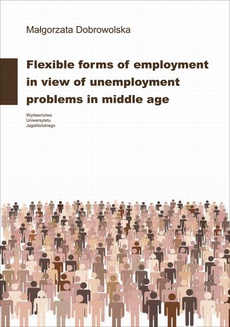INNE EBOOKI AUTORA

Flexible forms of employment in view of unemployment problems in middle age
Autor:
Format:
ibuk
e-ISBN: 978-83-233-8495-3
Flexible forms of employment have been presented in the book as one of key instruments in fighting unemployment. Although negative voices are raised about objective treatment of an employee, the lack of social security, uncertainty of employment, etc. many of these opinions are just myths and stereotypes. Similarly, general characteristics of the socio-professional activation of people over fifty is also connected with a number of common beliefs about how people in late adulthood function. Unfortunately, these convictions emphasise their worse psycho-social and intellectual functioning, which firstly, does not have any psychological justification, secondly, prevents the over 50's from benefitting from different forms of flexible employment. What is even worse, aid institutions are discouraged from creating adaptation programmes in non-standard employment and other socio-professional initiatives. Despite an exploratory nature of the research and a new focus on the functioning of people in "alternative" working conditions, its findings contributed to better understanding of regulatory mechanisms of people at work. An attempt was made to answer the question: to what extent can flexible forms of employment be an employment alternative for the over 50's? In the explanatory research one of the most important variables were the reasons of people over 50 for searching for work and the role of social support in unemployment. Another important issue was the contents of a psychological contract characterising the population in-question. The potential professional activity of people 50+ in flexible forms of employment was analysed with reference to the satisfaction scale, psychological costs of the job, perception of personal resources, psychological dimension of flexibility and a sense of self-efficacy.
| Rok wydania | 2011 |
|---|---|
| Liczba stron | 186 |
| Kategoria | Współczesne teorie socjologiczne |
| Wydawca | Wydawnictwo Uniwersytetu Jagiellońskiego |
| ISBN-13 | 978-83-233-3090-5 |
| Numer wydania | 1 |
| Język publikacji | polski |
| Informacja o sprzedawcy | ePWN sp. z o.o. |
POLECAMY
Ciekawe propozycje
Spis treści
| 1. Introduction | 7 |
| 2. The psychology of human development in late adulthood | 9 |
| 2.1. Changes in psycho-physical development | 9 |
| 2.2. Changes in psycho-social development | 12 |
| 3. Work and unemployment in an ageing society | 19 |
| 3.1. The role of work in human life | 20 |
| 3.2. Employment and careers of late adulthood | 25 |
| 3.3. Success and failure in the flexible labour market | 30 |
| 4. Diagnosis of the situation of the unemployed over fifty – the analysis of the research findings | 33 |
| 4.1. Reasons of the 50+ for searching for a job | 36 |
| 4.1.1. The role of social support in unemployment | 40 |
| 4.1.2. The contents of psychological contract characterising the unemployed 50+ | 55 |
| 4.2. Potential professional activity of the 50+ in flexible forms of employment | 63 |
| 4.2.1. Satisfaction of the job in people over 50 | 77 |
| 4.2.2. Psychological costs of the unemployed over 50 | 89 |
| 4.2.3. Perception of personal assets by the unemployed 50+ | 93 |
| 4.2.4. Psychological dimension of flexibility in people over 50 | 95 |
| 4.2.5. Attitudes towards work of people over fifty | 102 |
| 4.2.6. Assertiveness as a basic social competence of people over 50 | 105 |
| 4.2.7. The sense of self-efficacy in people 50+ | 117 |
| 5. Presentation of the results of selected psychological measures | 121 |
| 5.1. Psychological costs and demographic variables | 121 |
| 5.2. Perception of self-efficacy and demographic variables | 124 |
| 5.3. Personal flexibility and demographic variables | 128 |
| 5.4. Attitudes towards work and demographic variables | 131 |
| 5.5. Assertive skills and demographic variables | 136 |
| 5.6. Job satisfaction and demographic variables | 139 |
| 5.7. Relation between personal flexibility and psychological costs | 143 |
| 5.8. Relation between personal flexibility and perception of self-efficacy | 147 |
| 5.9. Relation between personal flexibility and a skill of assertive behaviour | 151 |
| 5.10. Relation between personal flexibility and job satisfaction | 154 |
| 5.11. Relation between the perception of self-efficacy and assertive skills | 158 |
| 6. Practical implications for preparing a strategy of solving social problems of professional integration of people in late adulthood | 163 |
| 7. Conclusion | 169 |
| Bibliography | 171 |
| Abstract (Polish) | 183 |
| Abstract (English) | 185 |



























